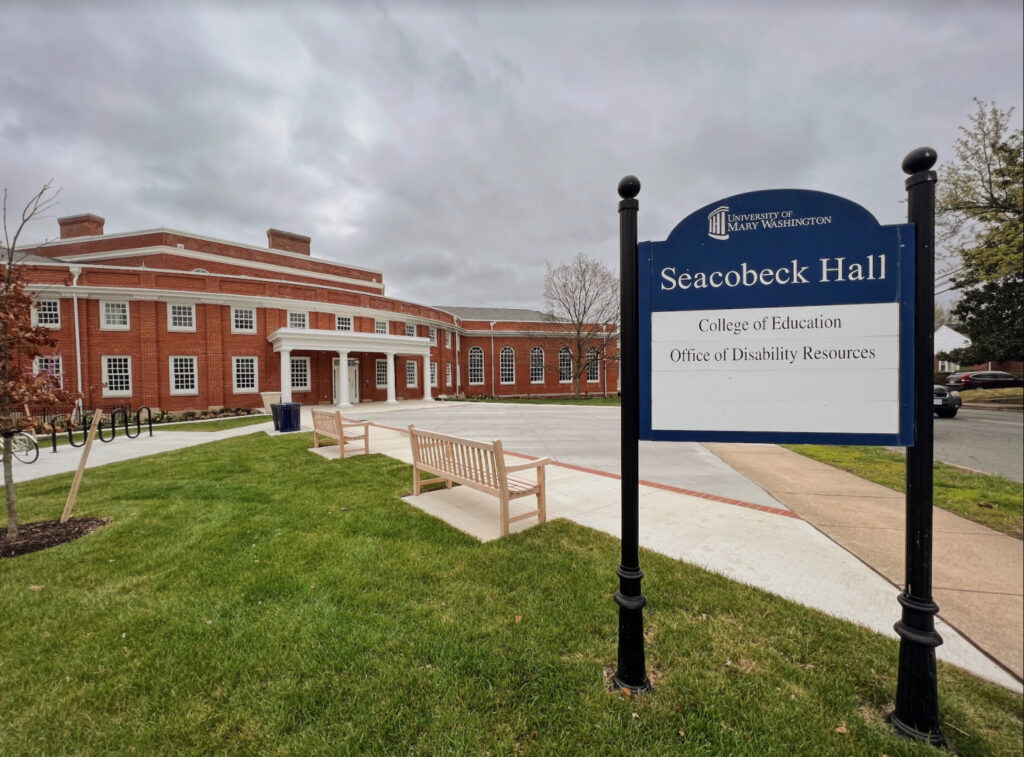Florida “Don’t Say Gay” Bill creates an unwelcome precedent and negative learning environment for LGBTQ+ youth
3 min read
Seacobeck Hall houses the College of Education where UMW's future teachers take classes. | Emily Warren, The Weekly Ringer
JENNIFER MCCULLOCH
Staff Writer
On March 8, 2022, the Don’t Say Gay bill was passed in Florida. This means that anything LGBTQ+ related will be taken out of the classrooms and not talked about. It also requires the schools to notify the parents if their child has any significant changes in their gender or emotional wellbeing. The bill is problematic, especially for queer kids in public schools. Instead of supporting the kids, the bill is harming them. It makes LGBTQ+ kids feel like they’re not accepted for who they are, which is detrimental for their mental health.
Young queer students need support. Almost every queer kid in the United States faces rejection from their family or bullying in school just for being who they are. Because of this, there is a higher rate of mental health issues among LGBTQ+ kids. It is important that queer youth have support so they can feel accepted and live a healthier life.
“Statistically speaking the suicide rate for queer children is reduced when they are told that being themselves is something to be proud of,” said Matias Esquivel, a sophomore undecided major.
The name of the bill itself is harmful and problematic. The name “Don’t Say Gay” can make queer kids feel like their identity is a taboo subject. It can also lead to dire consequences such as an increased negative sense of self and a decline in mental health. It also empowers parents to sue the school and teachers if they violate the guidelines the bill establishes.
When I saw the pride flag sitting on my teacher’s desk in high school, I immediately felt comfortable talking to them about my identity and the questions I had about it. Unfortunately, school systems lack a good support system for young queer kids. A study shows that if queer kids got the same support that straight kids get in school then their performance would go up and disparities in school connectedness would lessen by 90 to 100 percent.
Keona May, a senior English major who is also in the education program, agrees that schools should be a safe place for kids. “Schools should be a place where children are allowed to express themselves, learn more about themselves, and where they can see themselves in learning,” said May.
Glenn Youngkin just passed a bill to pass a policy on sexually explicit material for elementary and secondary school. For example, some queer books have been banned from the school library because they are too sexually explicit. Banned books are nothing new, but it’s upsetting to see queer books as the main targets. Representation matters for every kid, and removing things that represent them is harmful to their own self-image.
“I would still talk about queer things. Not talking about it seems more negative to me,” said Naomi Jones, a senior English major and aspiring teacher. “I’m not sure about Youngkin passing a bill on it, [but] I can understand why he would on sexual acts at school because it is a learning place. School should be seen as a safe space for everyone, although I’m not sure how the bill is going to go over at schools. Putting a bill or restoring on the queer community would be a step back.”
Kyra Breslow, a senior English major who is getting her master’s in secondary education, aspires to be a teacher and hopes that Youngkin would never pass a bill like the Don’t Say Gay bill in Virginia.
“I’m actually queer myself so having a ‘Don’t Say Gay’ bill would directly affect me, too,” Breslow said. “However, I’d be far more concerned about my students … People dislike what they don’t understand, so not educating students on the LGBT+ community will just increase [the] danger that the LGBT+ are already in.”
If a similar bill were passed in Virginia, it would harm future generations of students. Without proper information and access to representation, young students may not be able to develop their identities and sense of self. Furthermore, without representation, queer youth will feel even more alone in the world, further detrimenting their mental health.


